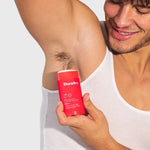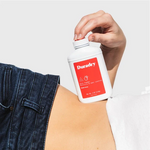Antiperspirants have many uses, but one of the most important is to block your sweat. But how does an antiperspirant work? What are its main ingredients? And why do we use them? Let's take a look at some of the benefits of each! Also, find out how antiperspirants work in comparison to deodorants. And then you'll be well-prepared to choose one over the other!
How does antiperspirant work to stop sweat?
What makes antiperspirants effective in stopping sweating is their ability to prevent the buildup of bacteria in the skin. While sweat itself does not smell, bacteria living on the skin can cause odor. The sweat glands in the armpits, groin, and nipple area are a perfect breeding ground for bacteria. However, people can take several steps to improve their skin health, including avoiding excessive sweating and keeping a dry environment.
Antiperspirants block sweat ducts by reacting with mucopolysaccharides in the skin and sweat duct. The result is a reduction in sweat gland activity and production. Typically, antiperspirants should be applied to the affected area at night, where they can block sweat ducts for up to 24 hours. Applying them as directed can make the area feel dry and fresh.
Regardless of the antiperspirant you use, it is best to apply it before bed. The antiperspirant works best when the pits are dry and clean. When applied at night, it has a better chance to penetrate the skin and block sweat ducts, helping you to avoid unpleasant body odor. However, if you are prone to excessive sweating, applying antiperspirant during the day may cause a buildup of bacteria in the pits.
Despite the fact that antiperspirants block sweat glands by up to 20%, they are only effective for a short period of time. The majority of antiperspirants contain aluminum as an active ingredient. Deodorants contain antibacterials. If you are extra sweaty, you should choose a clinical strength antiperspirant. This type of antiperspirant is not harmful to the health of anyone, but it is not suitable for people with kidney disease.
The most effective way to beat the sweaty armpits is by using an antiperspirant and deodorant. They are both designed to regulate sweating and prevent body odor, which is caused by bacteria. When sweat is deposited in the armpits, it creates a characteristic odor called trans-3-methyl-2-hexenoic acid. Antiperspirants and deodorants block the sweat pores, blocking their supply, and preventing bacterial growth. However, a good deodorant also includes a fragrance for backup purposes.
What is the main ingredient in antiperspirant?
The active ingredient in an antiperspirant is aluminum salts, a chemical that has been used for over 80 years to control sweat and body odor. Aluminum is naturally present in the environment, the third most common element on earth. It is nontoxic and occurs naturally in soil and water. It can also be found in many foods. While aluminum salts can be irritating to the skin, they are not harmful to the body in moderation.
The aluminum-based compounds found in antiperspirants act as a temporary blockage to sweat ducts. However, aluminum in antiperspirants is absorbed by the skin and can have estrogen-like effects. Because aluminum is absorbed through the skin, it is a common ingredient in antiperspirants. Some people are concerned about the side effects of aluminum. However, there are no studies proving that aluminum in antiperspirants causes breast cancer.
Aluminum chloride is a highly effective antiperspirant. It is an inorganic salt compound that binds to sweat glands and temporarily prevents perspiration. Its strength has been compared to other antiperspirants, and this salt is the most powerful. It is often preferred by people with extreme sweating as it is more effective in penetrating the sweat duct and reducing it at a deeper level.
Propylene glycol is another common ingredient in antiperspirant products. It is used to prevent substances from drying out and is known to be safe in moderate doses. There are many options available, so it is important to find one that suits you.
Antiperspirants can also protect the lymph nodes, which are important for the body's immune system. By blocking the sweat ducts, antiperspirant products will help prevent a buildup of bacteria and keep you dry. Antiperspirant ingredients will help kill bacteria and prevent the spread of germs, which causes the typical body odor.
Why do we use deodorants and antiperspirants?
Antiperspirants are used to combat the effects of sweat on the body. They can be used on any part of the body, including the armpits.
Deodorants and antiperspirants are commonly used to combat body odor. They work by increasing the acidity of the skin and killing the bacteria that cause the body to smell. The acidity of the skin makes it less attractive to bacteria and other fungi that cause odor. Deodorants will not keep you from sweating, but they do mask malodors. Deodorants don't keep you dry, so a good antiperspirant should be used before your clothes to prevent sweating.
Deodorants and antiperspirants have become popular cosmetic products. Both prevent perspiration while masking the body's odor. But how effective are these products? The answers lie in your own personal needs. A good deodorant will reduce the odor of sweat in the armpit area. If you sweat a lot, you may want to consider prescription antiperspirants.
Deodorants vs. Antiperspirants

You can use deodorants and antiperspirants interchangeably, but the two are not the same thing. Deodorants work by masking body odor, while antiperspirants block sweat. While deodorants may be more popular for everyday use, you should also consider the different types available for people with more severe sweating problems.
Although the two are different, both are beneficial. Antiperspirants are helpful for athletes and active people. They can reduce body odor by blocking sweat glands and preventing perspiration. Deodorants are also great for people with sensitive skin, as they are fragrance free. If you sweat excessively, you may want to consider using both deodorants and antiperspirants to prevent unpleasant odors.
Deodorant can be applied to the armpit at any time of the day. It should be reapplied to the armpit at least once, but you shouldn't put too much on or else you might be putting on more than you need. You can choose a deodorant with a pleasant fragrance, or one with no fragrance. There are also travel-size versions of many name-brand deodorants.
Antiperspirant is best used on dry, clean skin. Using an antiperspirant can protect you against sweat and odor for up to 24 hours, so the best way to combat sweaty armpits is to use both together. Using an antiperspirant incorrectly can increase the amount of bacteria that cause body odor.
If you have a sensitive area, you should consult with your doctor before using an antiperspirant. Also, apply antiperspirants at night, and not in the morning, when your body is less active. It allows the antiperspirant to fully activate and work, making it an excellent choice for people who sweat excessively. You can also use antiperspirant to block sweat in other areas of your body.


